#The M's Review of Books
Text
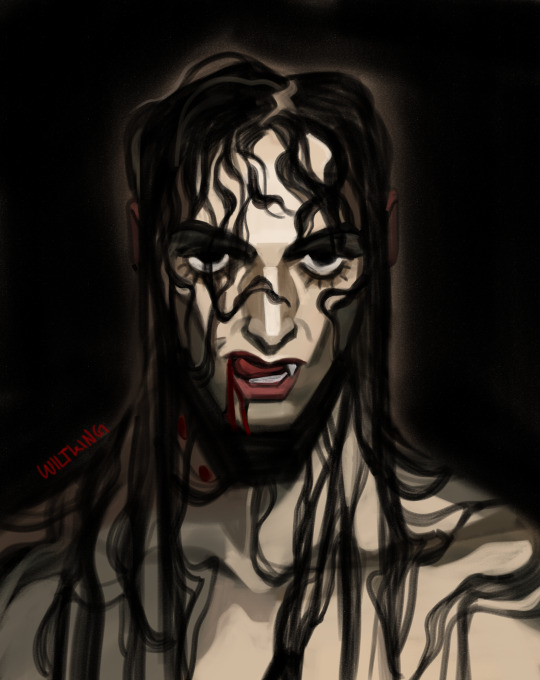
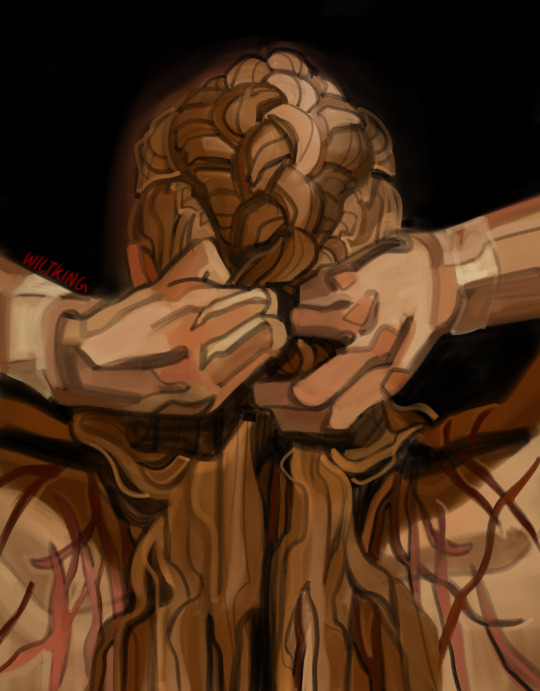

Asche and Vindt from Ocean's Blood by Thelma Mantey
#this book comes out january 29th. i finished reading the ARC this morning and well. here i am several hours later#starting the promo early because this shit hit all my dark fantasy m/m needs and i need more people to read this as soon as its available#you can find my review in the linked goodreads page if you want to know more. but for now i leave you with this <3#ocean's blood#asche#vindt#book fanart#lgbt books#fanart#digital#original art
2K notes
·
View notes
Text
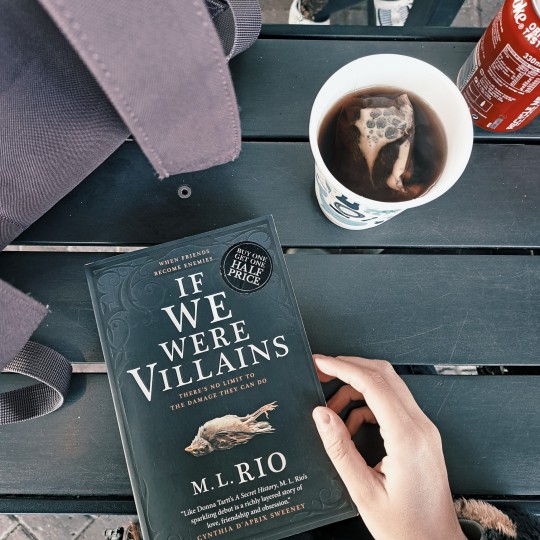
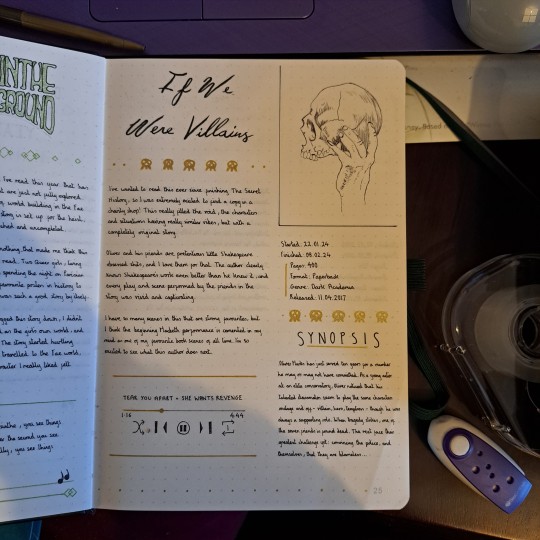
If We Were Villains // Bullet Journal Book Review
124 notes
·
View notes
Text
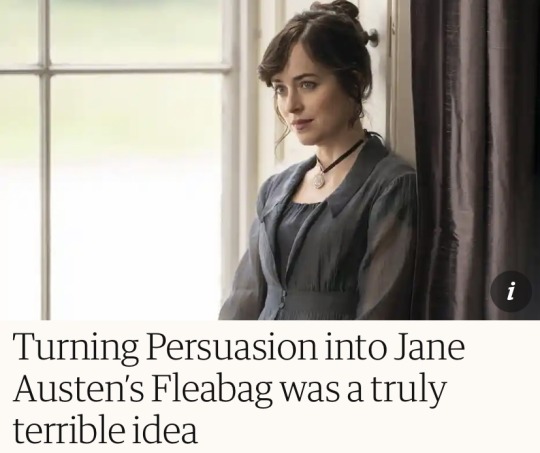
hollywood execs really spent millions of dollars on a production to find this out when i could’ve told them this for free
#PERSUASION of all fucking books of allllll fucking jane austen heroines you wanna fleabag girlboss badfeministify anne elliot???????#i will say tho i Am enjoying reading all the scathing reviews#but you know what i’d enjoy more? a good fucking adaptation of this book!!#persuasion#jane austen#dakota johnson#m
2K notes
·
View notes
Text

Honestly? 100% accurate. This may not be the most rave review my book has gotten so far, but it's definitely one of my favorites. Read the whole thing here.
#the shabti#ghost stories#historical fantasy#queer fiction#2024 debuts#ancient egypt#lgbtqia books#writing community#supernatural thriller#my art#goodreads review#hermann goschalk#gay character#jewish characters#m/m romance
28 notes
·
View notes
Text
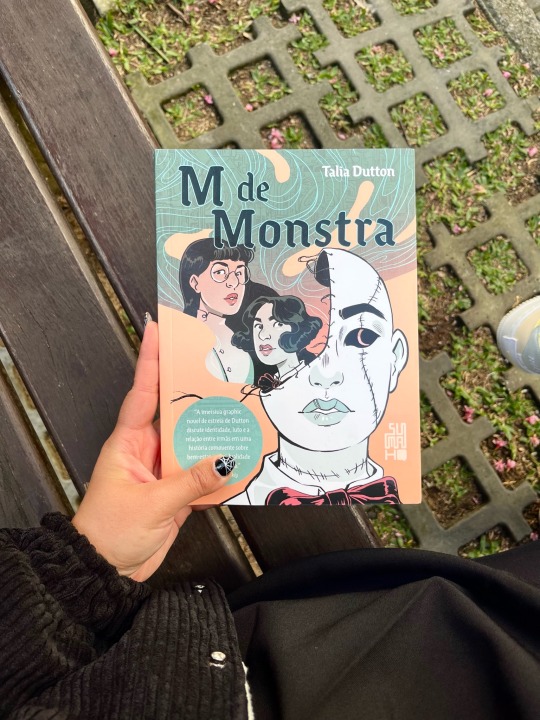
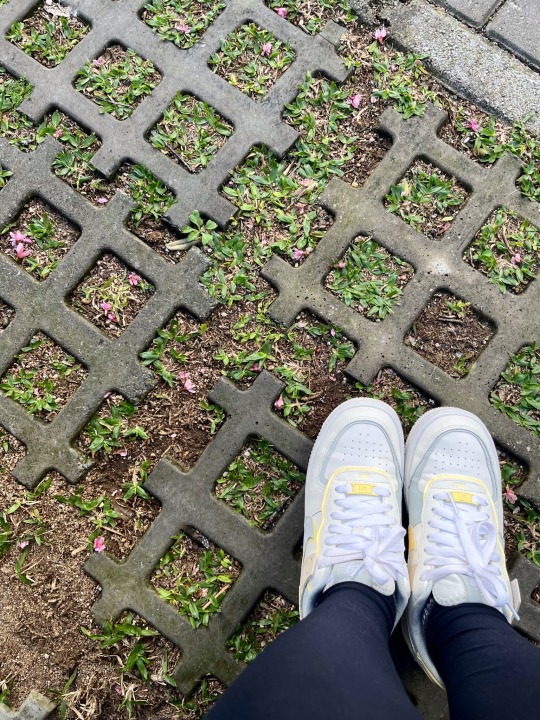
M Is for Monster is a thought-provoking graphic novel that explores themes of family and identity. The main character struggles to meet the expectations of others, but ultimately must decide what is best for them. The story is also a captivating retelling of Frankenstein. I highly recommend giving it a chance!
#booklr#graphic novels#book photography#m is for monster#m de monstra#talia dutton#read in 2024#book reviews#queer books#the refuge of books
37 notes
·
View notes
Text
Comparing “The Secret History” by Donna Tartt and “If We Were Villains” by M. L. Rio, a little while after finishing them both once, with no notes, no receipts, no knowledge of the antique classics or Shakespeare, and no one asking because I have no one to talk to about them, with varying levels of seriousness and sarcasm, over the course of random sleepless nights.
As to anyone who would ask why compare these two, it's because one of them has the name of the other right on its front fucking cover. (in some editions anyway)
Also, I don't hate If We Were Villains, I still think it's one of the better books, but I have a need to prove (mostly) to myself that THS is a better book with better characters, better plot, and better writing. If you love IWWV and hate THS, you're not wrong, you're entitled to do and like whatever you want. Keep doing what makes you happy.
Also excuse my grammar and syntax and spelling, I'm foreign and I'm doing my best.
#dark academia#the secret history#donna tartt#if we were villains#m l rio#aesthetic#novel#novel writing#books#novels#bookblr#books & libraries#literature#book review#media critique#shakespeare#homer
25 notes
·
View notes
Text
Ace Review: Role Playing by Cathy Yardley
a contemporary romance novel focusing on two video game nerds (affectionate) who meet online and fall in love
they are both over 45yo, which is rare in this genre
aiden is bi and aspec! his relationship with his sexuality is sooooo important to me
i loved the nerdiness of this book!!!
i also liked that they are both caretakers in a way. maggie is a mom of a college freshman and he is a nurse taking care of his mother because of her health conditions.
100% a friends to lovers story (finally!!!!)
i had a blast reading it!! i will be reading the authors other books!!
#ace stuff#role playing#cathy yardley#my book reviews#queer books#reminder that m/f books can be queer!!#ace week
47 notes
·
View notes
Text
If We Were Villains is THE book I have written down the most quotes from to this day. And after every quote I have written down, I deconstructed it and self reflected on it, linked it with my personal experiences and views.
Unhinged behaviour ikr
But if you feel that world does not understand you, you will always find shelter in book characters that are written the same way just like you are 📚
#iwwv#if we were villains#dark academia#bookblr#bookworm#books and reading#james farrow#oliver marks#m l rio#book review
26 notes
·
View notes
Text
Treasure Seekers 2 go brrrrr
So this sequel... exists :D
Welcome to the second entry in the Treasure Seekers trilogy that I'm gonna ramble about for the next six hours (in me time, in you time it's probably gonna be like thirty minutes or less), if you wanna read it yourself before reading this ramble, here's an Archive copy. Otherwise, enjoy the ride :D
So our story begins with the Thea Sisters locked in a basement in the dark, with Russia's penchant for matches (and the basement's lack of a smoke alarm) coming in clutch. Seems like another vacation's gone awry for them :3 How could it have possibly turned out this way?
Flashback: so the girls are vibing in Moscow, visiting all the cool sights and all that, Pam is wanting to try some Russian cuisine, when they spot this girl that's wearing what appears to be a barrette that used to belong to Aurora's sister Hannah Lane. They follow her a bit, find a THUG JUMPSCARE, follow the girl, Cassidy and co into the building they're heading into, and oh dear door with passcode is in the way. They find this dood Sergei, explain to him the situation, deal with him being like "who is u, and wth are you on about mate" until they hear a scream and oh dear turns out that girl with the barrette is Sergei's sister Irina and she's in trouble.
Sergei opens the door, they go in, walk in on Cassidy, Stan and Max (who I will from now call SM for simplicity) doing their whole thug jumpscare thing and kidnapping Irina in 4K. SM somehow rolls a high enough strength roll (or the girls roll a low enough initiative) that two roughly intimidating guys successfully trap six people into a basement without breaking a sweat get yourself some self-defense classes girls oml, and that's the end of that.
Luke's up to his shenanigans again, and it seems that he's targeted Irina Lenenko for the same reason the girls double-taked at the sight of her barrette: Irina (and Sergei in conjunction) is a descendant of Hannah Lane, and Hannah Lane may or may not have known a thing or two about one of the seven treasures. It's such a shame tho that Irina doesn't wanna spill any of the tea. What's this about a "queen's jewel"?
Oh also Luke has Aurora's third diary. I would like you to pay attention to this detail in particular. Oh and he's keeping Irina ratgrabbed until she tells them what he wants to know from her. Oh naur
Meanwhile the girls infodump all of the TS 1 LANE LOORRREEEE to Sergei in one whole sitting and finally manage to get around to "what the hell does this have to do with my sister". Sergei thinks it's not really possible for Irina to know anything about great-grandma Hannah's involvement with Aurora, but Irina's still in trouble soooo time to solve this nerdy-ass science trivia keypad puzzle to get outa the basement. Irina's nowhere to be found in the lab itself, so they regroup at Sergei's place to use his phone tracker app on his computer.
Bad news, SM dumped Irina's phone somewhere in the lab so the tracker app is useless; good news, while looking for some Lane Lore™ to get some context about the situation, the girls find some Lane Lore™ :D
-
Turns out Aurora was looking for one of the seven treasures again, y'know just updating her sister on that, who'd moved to Saint Petersburg with her husband Ivan.
Seems like Aurora's quest at the time involved "the queen's jewel", which Aurora said she was 1000% down to ramble about to Hannah, maybe when she's done finding all seven treasures and hiding them from Jan.
I would like to take this moment to remind you that Aurora is a British Amelia Earhart, and if you dunno what that means, look up what Earhart was famous for and then look at this with that given context :']
-
With that lead, the girls plus Sergei take a ride on presumably the Krasnaya Strela night train to Saint Petersburg, read some Lane Lore on the way, Peter-Griffin upon realizing that they spent the whole night reading AO3 fanfics Aurora's diaries and it's like 2AM now, land in Saint Petersburg, stop by Nevsky Prospekt Street to have some breakfast (I think they went to Venezia?), and discussion.
(For the rest of this review, please assume when I say "the girls", I'm including Sergei because Sergei tags along with them and helps them out in their entire journey. It's okay, Sergei may be biologically male but he is an honorary female in our hearts /j)
Aurora mentioned the queen's jewel in her diary, and when you're in Russia, the first queen that comes to mind is Catherine II, so maybe something relating to her? Some Lane Lore of Aurora taking interest in Catherine II's Amber Room in her palace specifically confirms their theories, sooooooooo it's time to go to the Amber Room to see if Aurora left any clu--


The girls are about to walk out of the Catherine Palace to Peter Griffin in private when SM JUMPSCARE--
So SM is stalkin' around the Catherine Palace looking for something, so the girls stalk them back and follow them out of the palace, into a car (the girls called a separate taxi to follow them), and to a little gray building in the outskirts of the city. They don't follow SM into the building because it might be dangerous, but Irina's scarf lying around near the premises confirms that Irina was in fact there and possibly being held hostage in the building.
The girls do a little tactic I like to call "the Ding Dong Ditch": Pam and Nicky knock on the door, SM answers it, do a little Metal Gear exclamation point "HOW DID YOU GET HERE", Nicky and Pam book it so SM chases them, and that's literally how the other girls plus Sergei sneak into the building to get Irina out. (You dunno how badly I wanted to make a videogame reference for this but I couldn't find anything so here we are--)
With that, the girls plus the Lenenko siblings book it outa there without SM being none the wiser (seriously it doesn't even cross their mind that there are more than two Thea Sisters, that's how dum they are). Irina books a hotel room at a friend's place and gives them some extra Lane Lore that she never told Klawitz despite the interrogations:
Hannah Lane was once visited by Aurora unexpectedly, a little after Hannah and her husband moved to a house near the Ob River, in Siberia. Possible lead :3c? The girls think maybe, so they decide to head on over to the exact address in Novosibirsk, Siberia.
In Siberia, the girls cross the frozen Ob River in Novosibirsk to this abandoned little house, where they find this little note with a riddle that talks about Cleopatra and an emerald she had at one point, and CASSIDY JUMPSCARE--
Cassidy busts in, snatches the note and books it away on her snowmobile before the girls can even react. You may be wondering, how the hell did Cassidy get there and know where they were? The answer is the same as the reason behind the SM jumpscares in Russia and in book 1, and that is Luke.
Luke Von Klawitz is doing a little segment that I like to call: Luke Touch Grass, where it becomes increasingly clear that Luke's spent way too much time on 4Chan (/j but you'll see what I mean). Luke hears about SM's failure and facepalms. Then he calls his friend Petrovski, who has access to the database of all of Russia's airports, for help tracking down "six mice leaving Saint Petersburg". Petrovski gives him results in minutes: the girls and Sergei are leaving Saint Petersburg and heading for Novosibirsk, Siberia (most likely Tolmachevo Airport). With that intel, Klawitz looks into his own database of Aurora Beatrix Lane, finds a picture of Hannah and Aurora together, and uses his own version of Google Lens to figure out the exact coordinates where the picture was taken, which happens to be in Novosibirsk, Siberia.
No this man does not in fact canonically touch grass on the regular, who's asking
Anyway so he sent Cassidy the coords, instructions and Aurora's diary to go, and that's how Cassidy walked in on the girls in that little abandoned hut next to Ob River. Only thing is uh, she dropped her purse on the way out. A purse that just so happened to contain Aurora's diary that Luke gave her.
So the girls scoop that puppy up and assume that the treasure is Cleopatra's emerald, thus they think it's in Egypt.
So the girls go to Egypt :D (29 and a half hour flight there good god no wonder they conked out in the plane--)
The girls read some Lane Lore, something about Aurora finding the treasure and hiding it somewhere in a desert, in an "expanse pure and white" that a star compass will lead to. First thing the girls think of at the desert bit is the White Desert (Sahara el Beyda), specifically a spot near Cleopatra's pool, so they leave the airport (not realizing Cassidy is following them now) and head over to a market to buy some supplies because might I remind you, they initially went to Moscow, Russia for vacation.
While in the market, Pam meets a guy named Omar. Pam tells him a little bit about them going to Cleopatra's pool in Sahara el Beyda, and she finds out that Omar just so happens to be an Archaeology major in Oxford University who's here on his summer vacation and works as a guide for Sahara el Beyda, and is more than down to give the girls a tour. Talk about lucky :D
The next day the girls take the scenic route and after a while make it to Siwa, where Omar books a room in a hotel for them, and the girls find this interesting myth there about Cleopatra that I will summarize here:
Cleopatra was once given a jewel that maxes out the owner's rizz and the effect is supposedly indefinite. Cleopatra liked the jewel so much that she wore it on her crown at all times... until she grew a bit self-conscious about the gem's maxxed rizz effect and how everyone kept eyeing the emerald a second too long for comfort, so she decided to hide away said rizz in a spot where none of her rivals could get to it. Oh and uh Cleopatra wrote up a dedication to Ra that's hella cryptic too.
One long rest later, the girls go to Cleopatra's pool on a donkey cart. Yes, a donkey cart. It was Omar's idea. Speaking of Omar, prepare yourself buddy because the girls have dubiously decided to give you some Lane Lore to chew on. O-oh you like it a lot. A lot a lot. Well okay cool, maybe you can help out, cool.
The girls manage to figure out the riddle in Cleopatra's dedication, find a little stone coffer that has the queen's treasure and-- SM JUMPSCARE
With a donkey as the girls' only escape method and Omar having suddenly disappeared, a scuffle ensues where the girls play hot potato with the box until SM gets their hands on it and opens it, and here we get a very accurate depiction of what SM and the girls found in the box once it was actually opened.
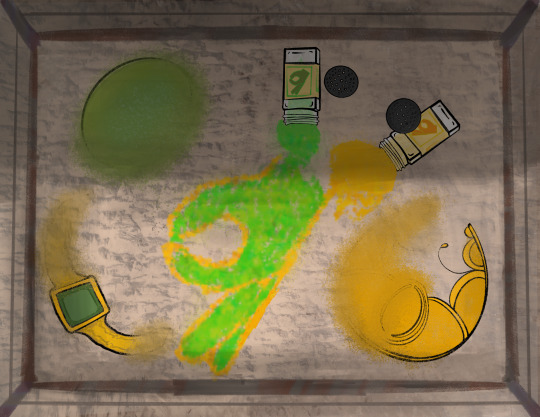
Description: a hand made of salt shaped in an upside-down "ok" symbol, circa 1920s-30s.
The sheer whiplash of this leaves both sides of the conflict losing enough HP that they're all on red-- SM is blaming the girls for this (how dare >:[) and dip. Omar is gone, and all the girls get as compensation is the empty box and a letter from Aurora telling them that they'll know to read the hidden clues. The girls head back feeling very hollow and dead inside, and this is the one time one of the girls questions how the hell did SM know they were at Siwa. I mean they never get any answer to this (kinda), but it is a milestone! They're aware of it now!
Once they get back to Cairo, they ask around and find that Omar's completely up and vanished, and they decide they'll just head back to Moscow since their investigation has come to a dead end. On the way, Pam comments about the falafel she bought being hella salty, which leads Violet to an epiphany that hey, the Sahara isn't the only desert that exists, let alone the only desert known for how white it is (like how Boracay Beach is known for how white and fine its sand is, but it's not the only white sand beach that exists). A quick Google search (and a long flight (35 HOURS CAIRO TO SUCRE???)) leads them to the Salar de Uyuni in Bolivia.
Nicky reserves a room for them at Hotel Luna Salada (a real place you can book a stay at actually :D), and they make a friend by the name of Adriana, a local waitress in the hotel restaurant. Adriana helps them pick out a dessert, fills them in on some stuff about the Salar since the girls came here 100% out of impulse, and talks about possible itinerary locations to go to, like the Isla de Pescado, Tiwanaku (the "Gate of the Sun"), Lake Titiaca, and Laguna Colorada. Y'know, typical tourist stuff, and Adriana was so kind to show them pictures she took when she visited said places herself! :D
Anyway so while the girls long rest, Luke is mulling about in his base waiting for updates. Someone calls him about the whole Egypt thing, and Luke calls the girls incompetent? Rude, oh and something about the caller being Luke's "secret weapon". Cassidy calls him on a theory she has about the gemstone being in Cleopatra's palace, and since the girls are currently long-resting (which means they aren't doing anything), Luke figures that a little diving trip in Alexandria to search for the gem with Cassidy won't hurt. Besides, he still has his secret weapon.
Oh yeah and he knows the girls are long resting because he has a drone in Bolivia spying on them and showing him their every move. Touch grass, Luke. No, going on a diving trip in Alexandria doesn't count, there's barely any grass there /j
Morning comes in Bolivia, and the girls head out early to search the Salar as much as they can. They look around the flat white desert, eat some late breakfast, toy around with forced perspective camera shenanigans for a bit, and read up on some LANE LOOORREEEEE
So Aurora's been to Pumapunku and Tiwanaku which is cool, she paid a visit to the archaeological site probably and that's really cool. She says something about hiding the queen's treasure in a fish's stomach covered in very fine thorns. Sergei ends up having an epiphany, and that leads the girls to Isla de Pescado, which just so happens to be "Fish Island" in Spanish, and has cacti on it, it's all coming together :D
Oh and the fish drawing Aurora made is coords to the treasure seemingly so that's cool-- OMAR JUMPSCARE
The girls are very surprised to find Omar joining them, and Omar explains that he booked it when SM came over and lost his cellphone as a result. However, he managed to figure out that Aurora's riddle was about salt and not sand, and decided to head on over to Bolivia since he assumed that's where the girls are going. How did he find them? It was just out of pure coincidence, and also the fact that the girls are extremely recognizable. Hm.
Anyway, Paulina plugs the coordinates into her GPS and leads the girls plus Omar to a little cave at the bottom of a little embankment. The girls find that, lo and behold, there's an old tin box containing a bright green emerald!
Meanwhile Luke is not finding anything in Alexandria haha L, LVK L get dunked on Luke, Cassidy girlie that's not a man to simp for find someone else gurl-- oh dear Luke is alerted that the treasure has been found and now he's planning on heading over to Bolivia? Now how could he possibly know that?
In the meantime, I dunno what's up in the air or if it's the Archaeology major speaking in him but Omar's really invested in this treasure, even more so than the girls to the degree that the girls are a little freaked out by it-- RHEA JUMPSCARE-- Paulina calms the big bord down and gets it to not trample Omar please, he's still a friend of theirs. Colette picks up this blue notebook Omar seems to have dropped.
The girls plus Omar head back to the SUVs, and Omar is really trying to persuade the girls that he should bring it back to Cairo. The girls are not jazzed at the idea because Omar bringing it back alone will be too unsafe, y'know with Luke and Cassidy and SM and all. They gotta think about this rationally-- WHOA OKAY OMAR calm your man tits buddy why are you demanding they trust you like you automatically deserve your trust-- ohh that's how Klawitz has known about the girls' whereabouts, Omar was working as a double agent.
So yeah Omar snatches the box from Colette and drives off in his SUV, leaving the girls in the dust. The girls freak out and are feeling that EMOTIONAL DAMAGE, but Colette for some reason is very calm about Omar booking it with the emerald. And that's because SHE HAS IT :D she did a lil' switcheroo so now the emerald's with her while the box is with Omar.
For context about how Colette knew about this, remember the blue notebook Omar dropped? Yeah that notebook was a company LVK notebook, straight from Luke himself. Then after Colette saw it, everything about Omar became incredibly sus, so she performed this precautionary measure.
So now the girls talk to the local authorities about how the whole thing with the emerald is gonna go down, and soon the girls are waiting for a plane back to Moscow.
As for Omar, well, he goes over to Luke's super-fancy hotel in La Paz, Bolivia, and he hands the box to Luke, explicitly stating that he decided he'd let Luke open it before he himself can appreciate it.
Luke opens the box, and here we see an accurate depiction of what Luke sees.
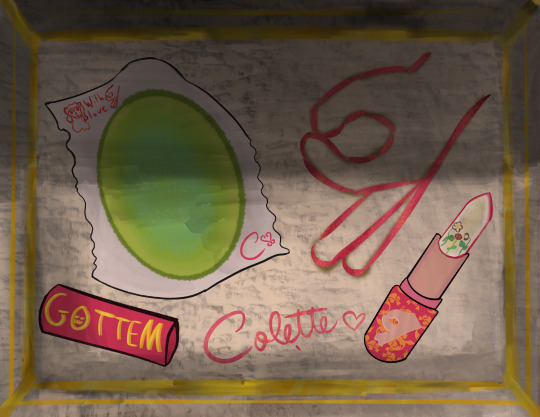
Description: an upside-down "ok" symbol drawn in strawberry pink lip balm, signed Colette [insert last name], circa 2018.
Luke punts the box (prolly with the lip balm still inside it) into the swimming pool, tells Omar to get out, and that's the end of that. Haha Omar L Luke L
The girls head back to Moscow to drop Sergei off when SURPRISE PARTY BY IRINA'S SQUAD :DDD
Then the girls are about to return to Whale Island to presumably Peter Griffin in their dorms, when Colette suggests they make a journal a la Aurora Beatrix Lane, and they do. In a pink notebook because it was Colette's idea so we might as well give her that
And they take a black-and-white group picture of them wearing adventurer clothes like Aurora would've done. The brainrot is real, these girls are mentally ill /j
And that's the book :D
... Honestly it's the most meh out of the trilogy besides the big-brain bits in the middle and the end imo
The writing was so much more stilted in this one, even for Scholastic standards, and everything feels pretty..... kid's book. Even more so than the usual in the book's English translations. I do readings for the books in some of my Discords, and this book did not read well at aaallll. And I haven't even mentioned the typos in the book (they're not a lot, but they exist, and they're kinda egregious :D) and some grammar errors if I'm remembering things correctly. It might just be a translation thing-- I worry a bit for the translator who had to put this together.
Luke's character here is also kinda wonk? For one we see him directly contradict his anti-friendship spiel in TS 1 since he literally greets Petrovski like a friend (maybe it's a "friendship doesn't exist except in 4Chan" thing, I dunno). Then in the middle of the book, he gets... very Disney villain-y. The most egregious example here is the chapter "Lurking in the Shadows", where as you can see
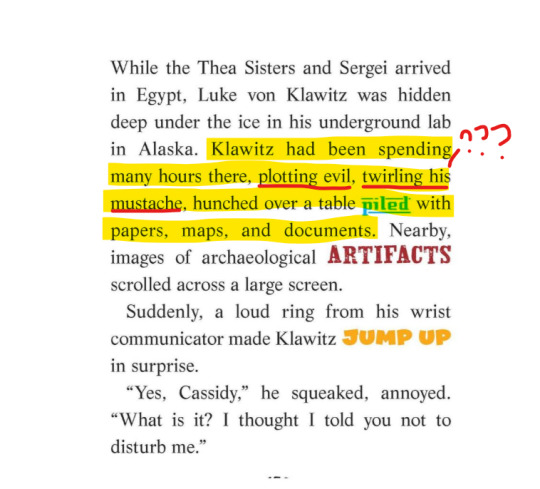
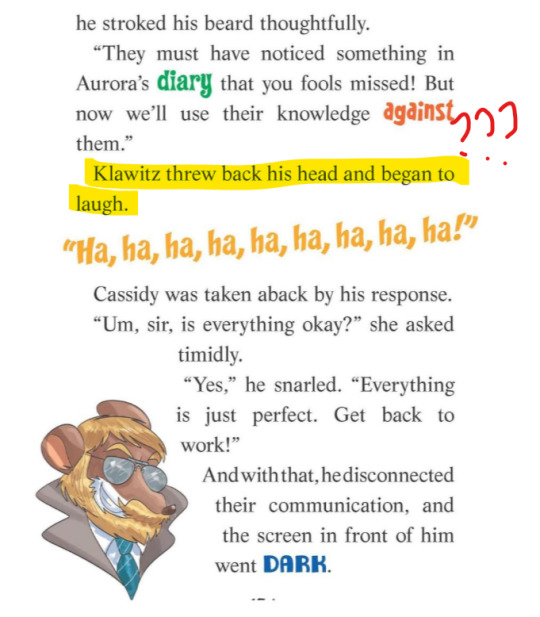
I am confusion?? Luke has been described as a to-the-point brat who hardly cares for the means to his end (unless it will impact his ability to achieve the end) and is so fixated on his goal that he doesn't touch grass. Is this not-touching-grass behavior? Yeah, definitely, but this??? This is too Disney villain???? Why does the man break into an evil cackle in front of Cassidy???? I understood it in book 1 because man thinks he's doing a "You may think you have outsmarted me but I have OUTSMARTED YOUR OUTSMARTING", but this one?? Maybe it's my personal taste, but it's too cartoonish and too... deviated from what we know of him up to this point.
ALSO TWIRLING HIS MUSTACHE? WHAT MUSTACHE IS HE TWIRLING THAT THING IS NOT TWIRL-ABLE
Also time to address the one big plot hole in this book: Aurora's diary.
So in this book there's only one diary, which is infinitely simpler than the two we got in the first book. This diary supposedly contains Aurora's records of her mission in hiding Cleopatra's Rizzmerald, and the details are supposedly vague enough that Luke felt the need to kidnap and interrogate Irina, a Hannah Lane descendant, to fill in the blanks. However, when you look at the contents of the diary itself (which lord knows how many times Luke himself has looked through it), there's hardly any blanks that need to be filled, at least if you're Luke.
The diary itself is mostly in the background-- like I said, not as much Lane Lore here as the previous book, the girls mostly rely on Aurora's letters to Hannah here-- but there's one specific entry the girls read in the latter half of the book that explicitly mentions Pumapunku and Tiwanaku, and how Aurora is there for her mission to hide the emerald. Complete with coordinates hidden in a little drawing! My one question I have for Luke is, why didn't he go straight to Bolivia and started searching there? Why did he go through all the effort of kidnapping Irina, tailing the girls around Sahara el Beyda, letting SM fall for the salt replica gambit, left his base to touch grass and go on a dive with Cassidy in Egypt; all if he could've just gone straight to Bolivia to look for the treasure there? Sure, Aurora did a good job hiding the coordinates in the fish doodle, but someone as observant and as obsessed about the outcome instead of the journey like Luke would rather have sidestepped all the Aurora shenanigans and beelined straight to the goal if he was able to.
Luke hardly has an excuse here because he owned the diary at the start of the book, and most definitely read through it many times (and we know he's the type to do this, see TS 1). The plot hole is plot hole-ing, it seems :/
Maybe it was just an excuse for the girls to get a giant glowing arrow pointing in the direction of the treasure? It certainly feels like it.
Anyway, the things that carry this book and made it memorable when I first read it (and allowed me to ignore the iffy bits) are the gottems and Omar as a character. Aurora setting up a salt replica of the Rizzmerald as a gottem in a time capsule, only to be opened almost a hundred years later to still be as potent as intended when it was made so long ago? That is amazing, like c'mon, pure comedy material.
Even funnier is Colette doing the exact same thing, only with her lip balm. Luke is quaking in his bougie-ass leather boots.
Now for Omar. This may be a hot take of mine here, but Omar's sus-ness is actually at a decent level compared to the girls and what they usually deal with. On one hand, Omar is incredibly suspicious with how incredibly lucky the girls are to find an Archaeology Oxford major working as a Sahara el Beyda tour guide; but on the other hand, the girls had almost the exact same situation with Diego in Mexico (I didn't mention him in the first review, but he came in clutch in TS 1).
The girls met Diego in Merida, Mexico, and he helped them with their research into "the invisible place", which happened to be Uxmal, along the Puuc Route. Diego also just so happened to be a tour-guide-in-training for the Puuc Route, which was the place the girls just so happened to need to go to find Aurora's second journal.
In comparison, the girls meet Omar in Khan El-Khalili while they were looking for supplies for their trip to the Siwa Oasis. It comes up in conversation that the girls are headed to Siwa, and Omar just so happened to be a tour guide for Sahara el Beyda, which was where the Siwa Oasis is, and it just so happened to be where the girls needed to go. When you stack them up together, it made perfect sense that the girls thought they could trust him-- Diego didn't know much about their trip and helped them the best he could (which was a lot), so why wouldn't Omar do the same? He's an Oxford Archaeology major, too, for crying out loud, the girls struck gold in the end!
Gold that was too shiny and too good to be true. Gold that was, in the end, nothing more than pyrite, fool's gold.
Omar is a good case for why you should be careful with who you trust, and when you should start thinking a little bit when you're getting a little too lucky with the people you meet. When the girls got to know him a little more and decided to trust him and tell him the deal with their trip, he got way invested in the gem-- too invested to not be a little bit suspicious. Maybe the girls mistook it for his passion for his archaeology major, maybe they mistook it for something else-- but whatever the case, Omar pulled the cheesecloth over the girls' eyes and really only fell apart near the end, when his alibis and behavior started becoming more and more suspicious; and by then, Omar didn't need to be as inconspicuous, and the girls had gotten to know him too much to readily say to him "okay buddy can you kindly f%ck off, your vibes are not vibing here".
The girls probably should've been suspicious when Omar reappeared in Bolivia out of nowhere, but I guess his alibi was just good enough (and the girls at this point were probably running on adrenaline, caffeine and a brain on 70% capacity at most) to pass the Deception check.
Fr tho there were some bits where the girls should've found him sus but they didn't (him accidentally saying "I did it" when they uncovered the emerald, and also him handling the emerald the way he did), so shrugs. It could be a translation thing, but it could also be something else.
Anyway, kinda meh for a sequel, but it does have its standouts that allow it to somewhat stand on the same level as the first and third books. Kinda.
Hey, at least it's not as bad as Crystal Fairies-- that's the bar of bad-ness I'm setting. It's not as bad as Crystal Fairies and that's what matters--
Also special thanks to @ishmeowwow (it won't let me ping you for some reason bestie <:[) for making the lil' artworks haha
#geronimo stilton#thea sisters#thea stilton#book review#book rambles#book rant#thank you ishmeow for making the gottems for me :D#you came in clutch while my ipad is still dieded thank you bestie <3#in the book it's just the lip balm but ishmeow decided to go all-out with the gottem gag and i can't be more grateful lmao#same goes with the gemstone in aurora's gottem (it's just the fake tiara plus fake gem) but hey the more salt the merrier :D#book 2 luke is so jarringly different from his other depictions but at the same time#he does not in fact touch grass and he does crack an evil cackle at least once a book so#i dunno how i feel about it . .#on one hand it adds to him not touching grass#but on the other hand it doesn't connect with his “this villain is supposed to make you shnit your pants at how intimidating he is”#he's intimidating because of his connections his ability to basically spy on the entire world and control everything from his base#and y'know he can tell his goons to do whatever and they'll literally wreak havoc to fulfill said requests#he was so intimidating in concept that they had to nerf him with incompetent goons lmao#after doing last minute research i am deeply concerned for the girls' wallets and their mental and physical health :D#like good god i thought a ten hour flight was unbearable and made your body stiff but holy damn#i'm not complaining too much about the timeline tho because this is hilarious and makes the girls look so neurodivergent#“what do you mean we flew a total of 64 hours by plane feels like it's only been a day to m--”#*dies*
11 notes
·
View notes
Photo
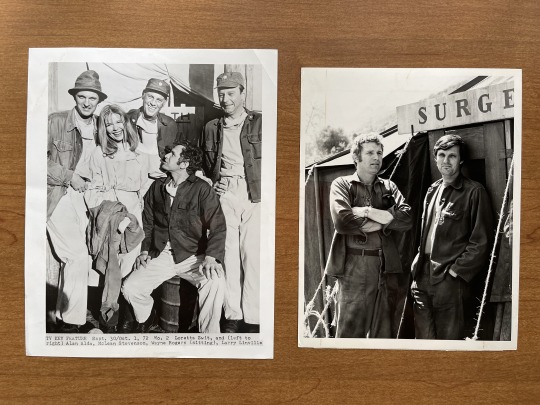

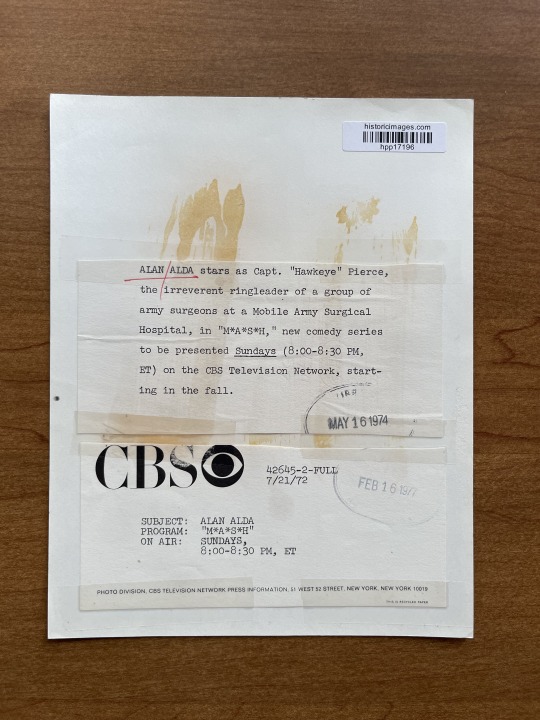
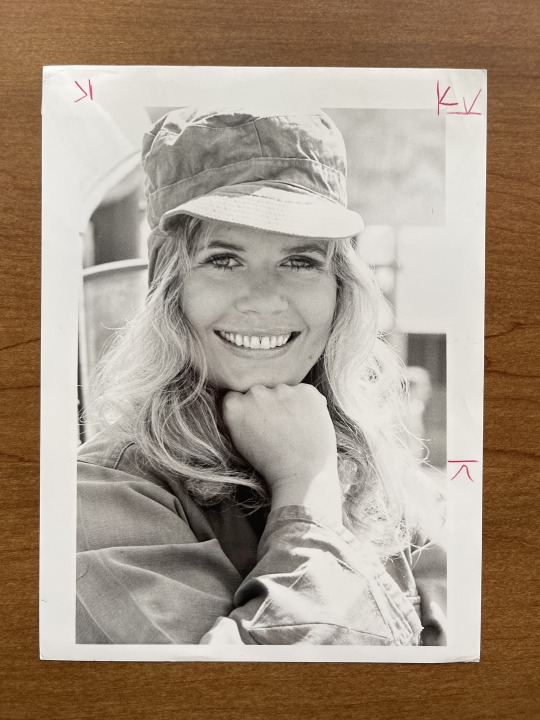

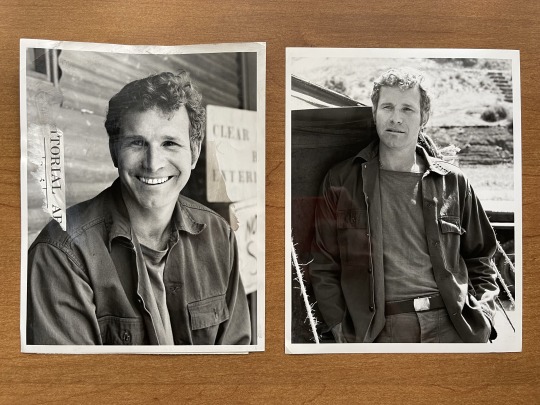
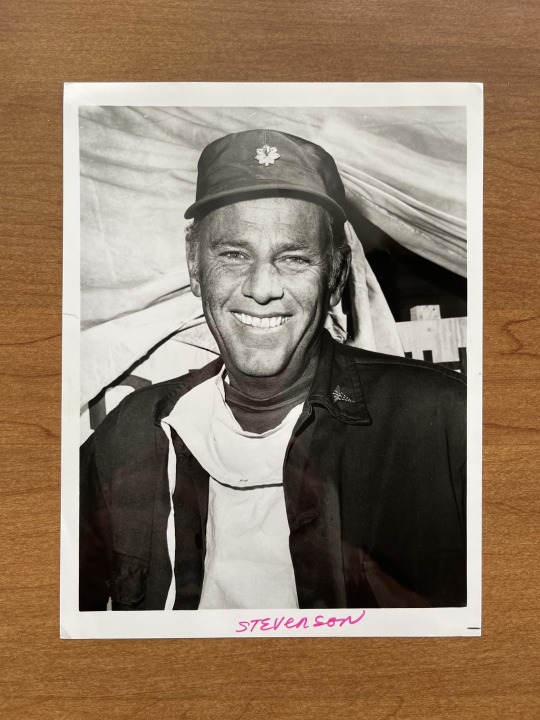

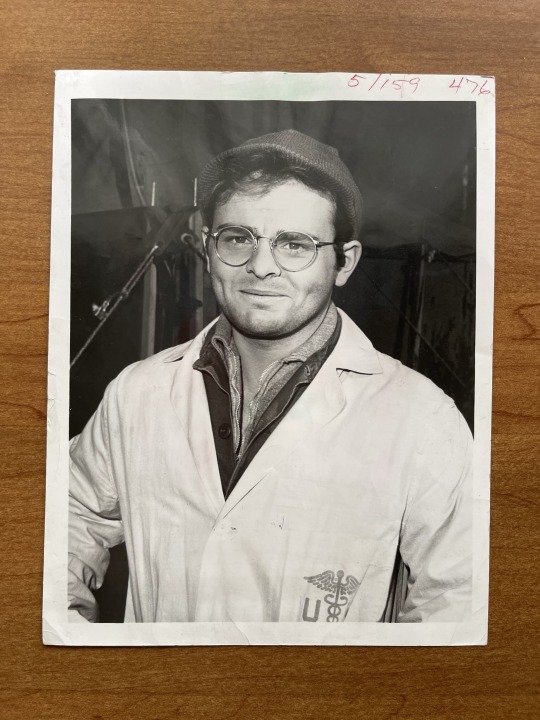
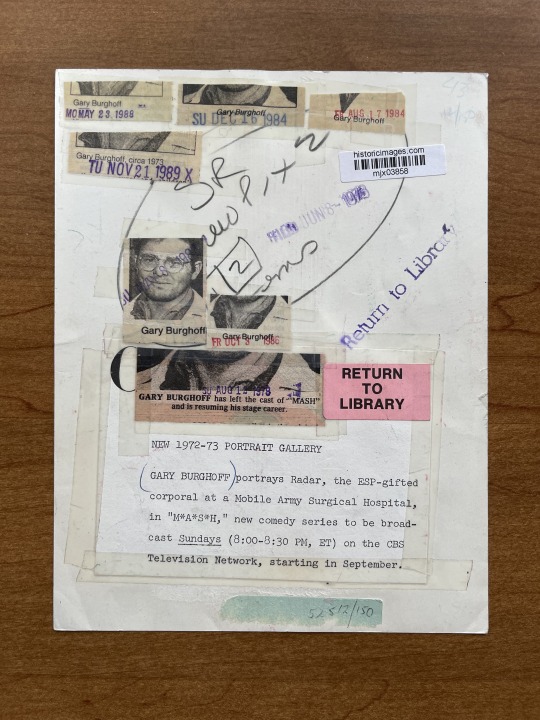
promo images of the cast from mid-1972, before season 1 aired
(source: The M*A*S*H Historian)
#(super great site btw! he reviews m*a*s*h related books and scripts and stuff)#anyway i havent seen some of these so i'm posting#mash#m*a*s*h#alan alda#loretta swit#wayne rogers#mclean stevenson#gary burghoff#larry linville#s1
272 notes
·
View notes
Text
Book Review 5 - The Bright Ages by Matthew Gabrielle and David M. Perry
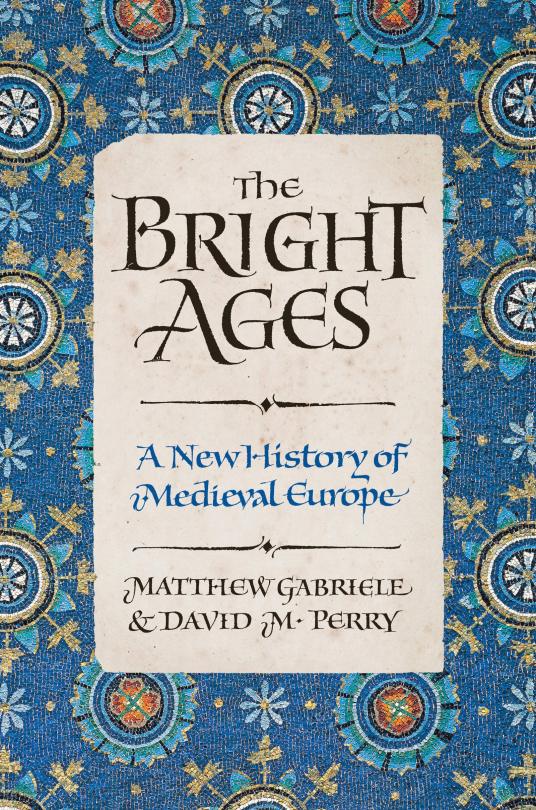
Okay, the Harper Collins strike is over, so I can finally post this! As you might notice, the wait has meant I have ended up writing far too much of it. Turns out people really are telling the truth when they say writing negative reviews is funner and easier.
Anyway, I did not like this book! It’s an ungainly thing, torn halfway between wanting to be pop history and wanting to be an intervention in the discourse, and entirely too short to do either well. Insofar as is it history, it’s far less revolutionary than it seems to think it is, and the subjects it actually focuses on either already fit entirely into the pop understanding the book is positioning itself against, or else entirely about symbolism and architecture and generally abstracted from (being partial and small-minded) the stuff I’m actually interested in.
All that said the first and fundamental is pretty simple – it’s just altogether too short to do what it wants to. The book tries to be a history of the European Middle Ages – a thousand years of history for an entire continent (more than, given the repeated digressions about the Middle East and also the Mongols one time) – in 200 pages. Which is just, like, I mean I don’t want to say impossible, but I can’t really see any way you’d do it. Which means what we actually get is a series of snapshots, scattered across space and time – just specific, particular dynamics or situations that rarely have much to do with each other. I’m pretty sure the only specific place we ever return to after focusing on it is Ravenna, and that’s for a big, dramatic bookend starting the age with Galla Placidia and ending with Dante. Also the return is really more about Italian city states as a whole. Which is to say only Florence gets any detail at all.
A necessary causality of the snapshot approach is that there’s wide swathes of the period that just, aren’t mentioned in the slightest. Which again, fair, but also it’s a bit much for one of the lacuna to be the entire Holy Roman Empire, right? (Okay, not the entire, there’s repeated off hand mentions of Emperors, and also talk of how the Italian city-states fought the Empire. Just never any description whatsoever of what it, like, was. Except for the specific disavowal of saying it started with Charlemagne, which was never followed up on.) Which is still better than what Poland or Hungary or Lithuania or Kievan Rus got – if any of them were even mentioned, it was only off hand. Which does end up giving the impression that Medieval Europe included Jerusalem but not Krakow – to be fair, something a lot of actual Medieval people might have totally agree with. But given the amount of time spent on the Crusades to the Levant and the Albigensian Crusade, not even mentioning the bloody Christianize of the Baltic in passing feels negligent to the point of being actively misleading.
Also it’s weird, given the books whole focus on connections and commerce between Europe and the rider world – the steppe is right there! You don’t need to wait for the Mongols!
Speaking of – they give a bunch of apologia for the Mongol Empire that’s – well, basically the same stuff all empires get, brought safety to the roads and allowed free movement and trade, brought people together, spread culture and technology, enlightened and cosmopolitan, etc. Which I mostly just find funny because of how obvious it is the authors would, uh, probably not endorse the same sentiment for any more recent imperial projects.
But okay – it’s not that you can’t tell a useful history in what might seem to be way too little space – John Darwin tries to tell a literal history of the world from the 16th century in ~500 pages and I’d still say After Tamerlane is absolutely worthwhile reading. You just need, you know, discipline. Focus. A firm idea of your thesis and an obsession of what’s relevant to it (or just be entertaining and full of fun memorable trivia). So, what are Perry and Gabrielle actually trying to do here?
Honestly, it’s a little bit unclear? The thesis they present is that the Dark Ages didn’t exist – they insist on referring the whole Medieval period as ‘the Bright Ages’ through the entire book, it’s incredibly annoying – and that the Medieval period get a horribly unjustified bad wrap as uniquely cruel and provincial and barbaric and full of disease, illiteracy, superstition, etc. They explicitly position themselves as being a reaction to the vision of the past you see in Game of Thrones or Vikings (I’d say ‘or the Witcher’ but again, for the purposes of this book Eastern Europe doesn’t exist). Instead, they fill the book with hand picked examples of medieval beauty, sophistication, and connection to the wider world with the quite explicit contention that everything good about the Renaissance (and later) was really just outgrowths of the Medieval, and it was only the bad stuff that was new.
(At the same time, they also do not like white nationalists, and go out of their way at length on numerous occasions to remind you that Nazis are bad. Those digressions do always leave me wondering who they’re for – no actual Deus Vult type is going to get more than five pages into it, and they rarely get much deeper that surface level refutation of things no one else is likely to actually believe.)
Anyway – look, the central, overriding problem of the book is that it’s not nearly as revolutionary as it seems to think it is. Very problematic, when it has such a high opinion of itself for being so. The assorted trivia the book uses as shocking examples of how cosmopolitan and tolerant the period was mostly just, well, fit perfectly fine into the popular imagining of the Medieval era? Like ‘royals and elites imported foreign luxury goods and status symbols at great expense; missionaries, adventurers and religious emissaries travelled across Eurasia to preach, trade and try to find someone to help them invade Muslims ; women often wielded significant political influence by virtue of royal birth of marriage, and were active political players’ – are these statements shocking to literally anyone? Basically all of that literally happens in Game of Thrones!
Part of that is that the book keeps almost committing to a really radical thesis – not to say pure unreconstructed romanticism, but close to it – and then always has an attack of professional ethics and cringes away from it, and just awkwardly brings up how, to be sue, there were serfs and slaves and atrocities, but nonetheless when you think about it the later Crusader States really were fascinating sites of cultural exchange, or whatever.
Psychoanalyzing the authors is bad form, of course, but like – reading this book the overriding sense you get is that they’re proud progressives, and have dedicated their lives to studying the Medieval era. But in the contemporary discourse people on their side use ‘Medieval’ as an insult to mean patriarchal, or brutal, or cruel, and the people who like the Medieval era are all in the Sack of Jerusalem Fandom. The sheer angst and righteous indignation they have about this state of affairs just about oozes through every page – honestly if I’m being maximally pithy and uncharitable, you rather get the sense that the real aim of the book is to make ‘being really into Medieval history’ a less reactionary-coded interest to bring up at professional-class dinner parties.
But honestly I could have forgiven almost all of this if the anecdotes and snapshots the book did focus on were informative and interesting. And this is almost entirely pure personal preference, I fully acknowledge but – the things that the book chose to focus on just really weren’t, to me?
Which is to say that The Bright Ages is incredibly interested in architectural and monumental symbolism, especially of the religious variety – there are whole chapters overwhelmingly dedicated to exploring the layout of churches and how their architecture and lighting was meant to convey meaning, or detailing at great length a specific monumental cross in northern England. These are used as synecdoches for broader topics, of course but, like, an awful lot of word count really is dedicated to describing how Gala Placedia’s chapel in Ravenna must have wowed people. And even as far as using them as synecdoches – the way that monasteries, bishops and the royal household in Paris competed to have the most impressive church/chapel as a way to convey religious authority is genuinely interesting, but I’d honestly have rather heard a lot more of the actual politics and sociology or how sacred authority and legitimacy was gathered around the Capetians in the later middle ages and a lot less about how specifically impressive the royal chapel on the palace grounds was. There’s a massive amount of symbolic and artistic detail, a fair amount of time spent charting great thinkers and proving that there was too such a thing as a Medieval intellectual, and almost none at all on, like, political and social and (god forbid) economic history. Which are, unfortunately, the bits of it I’m actually interested in.
The book isn’t just architecture of course, but much of the rest is either very basic – yes, the vikings were traders as well as raiders and travelled shockingly long distances, yes there was intellectual interchange between Muslim, Jewish and Christian thinkers across the Mediterranean, yes the Church acted as a vital sponsor of learning and scholarship. I’m sure these are new information to like, someone? - or so caught up in historiographical arguments and qualifications that it loses sight of the actual subject – I swear the book spent more time saying that it’s wrong to call it a Carolingian Renaissance because that implies there were actual dark ages before and after than it does explaining why anyone actually would.
Beyond that – okay, so as mentioned this book is really consciously progressive. Which, beyond a certain antiquarian distaste for how desperately they’re trying to get across ‘see, our field of study is Relevant! And Important! Please please please give us tenure/prestige/funding’ I wholly support. (I mean, like, I do think Medieval Studies deserves tenure/prestige/funding. Just slightly unbecoming to so transparently be grasping for it, and also more than a bit self-defeating) - but, like, the book’s politics are weird? Or weirdly surface level and slightly confused, given how much of the book is focused around them.
Like – the book spends a massive amount of time and attention combating the myth that women in the middle ages were all cloistered and politically mute and totally powerless. But the sum total of what it actually says is ‘did you know: elite women in the aristocracy and church exercised political influence? And a lot of the Christianization of western Europe happened through highborn christian women marrying pagan kings and raising their children Christian?” And while I suppose ‘elite women have influence even in patriarchal societies’ is a useful fact for someone to learn, I’m not sure examples that more or less cash out to ‘queens could have power by manipulating their husbands and sons’ is a particularly novel or progressive take, you know? More broadly – it’s a weakness of the book’s framework of jumping across countries and centuries between anecdotes that we never get any sense of gender roles and how power and influence were gendered systemically, so much as single (or if you’re very lucky, two or three) particular women with a vague gesture that they’re kind of typical. Not to complain about a lack of theory, but there’s really basically zero theory.
The book’s choices of examples for women to focus on are also – okay, not to be all ‘why didn’t you talk about my faves’, but insofar as you’re talking how women were able to exercise power, it’s really very odd that you never talk about any women who, like, ruled in their own right? C’mon, you mention the Anarchy offhand to introduce Eleanor of Aquitaine but don’t even say what it was about, let alone talk about the Empress Matilda? (I’d say the same thing about Matilda of Tuscany and the investiture Controversy, but it’s not like the book actually talks about the Investiture Controversy beyond the absolute basics, so). The final result is a book that talks a lot about how elite women had influence, and then the influence they actually bring up is almost always of the most stereotypically feminine-gender variety imaginable.
All that really pales to how confused the book seems when it talks about Christianity. Which it has to, of course, fairly constantly – it’s a book about Medieval Europe. But it’s kind of horribly torn between two imperatives here – on the one hand, it desperately wants to fight back against the whole black legend of the tyrannical, book-burning, Galileo-murdering, science-suppressing hopelessly venal and corrupt, all-powering Magesterium. But on the other, they really don’t want to come off as supporting, well, the heretic murdering and antisemitism or being the sort of guy online who posts memes of the Knights Templar. So you see this somewhat exhausting two-step where they go on at length about all the beautiful architecture and scholarship preservation the church did interrupted every so often by this concession about how of course it wasn’t all good and obviously pogroms and burning heretics wasn’t great, but- (The chapter on the vikings is much the same, except with a much clearer ‘it’s important not to romanticize these people because the people who do that are white nationalists, but also see how tolerant and far-ranging and cool they are?’)
Discussing the Church is also a place where the book’s whole allergy to social structure and institutions really serves it poorly. I at a certain point stopped keeping count of the number of times where the book called out that the centralized, papal-centric Church was a creation of the high middle ages, and not at all how things worked for most of the period. But then they just never actually explain how they worked instead, or really even how things changed to so enshrine the Pope’s power. They talk about how convents could be wealthy and powerful landholders and their abbesses’ wield significant power, but never even gesture at explaining how they interfaced with the institutional church. It’s really very frustrating.
Of course Christianity still gets far better treatment than Judaism or Islam – there’s a chapter which goes into some detail on the life of Maimonides in the process of extolling Medieval scholarship and talking about how classical learning was never really lost and the Renaissance is fake news. But despite the gestures to the presence of Jewish communities throughout Europe there’s essentially zero, like, description of how they actually functioned, or were organized, or (aside from the occasionally mentioned pogroms) how they interacted with their christian neighbours. The treatment of Islam is much the same – there are some mentions of the Islamic wold and its intellectual traditions, but essentially just to rehash the same points about the Islamic Golden age and Ibn Sina and all the other bits of trivia everyone probably picked up keeping up with the culture war during the Bush Administration. But again, only the most passing mentions of, like, politics or organization or even theology. It felt gratingly cursory, given the emphasis placed on the fact that eg Al Andulas was clearly part of Medieval Europe
Underneath all this is just the fact that The Bright Ages is almost an entirely a history of the elite. Peasants, serfs and slaves only exist in the for the sake of concessions about how of course things weren’t all good. The book has almost no interest in the lives of the lower classes, and barely seems to realize this. It starts to really, really grate, especially when you’re making all these implicit judgments about how the Medieval era was compared to what came after – in which case, the lives of, like, 90% of the population are rather important! Like unironically peasant life is fascinating! What did life actually look like of the overwhelmingly majority of people? If you want to give a sketch of the entire era, it’s kind of important.
I’m almost certainly being unfair here – basically everything about the book’s sensibilities grated on me, so I can’t say I was trying to be especially charitable. But really – the book’s perfectly fine light reading, but as intentional propaganda is hamfisted and it’s unclear who it’s for, and as an actual history it’s just...bad. It’s useful as a way to get a sense of the discourse, I guess, but otherwise I couldn’t really recommend it.
76 notes
·
View notes
Text
~ August's Books Reviewed ~
The month started out strong with me riding a Sanderson high, then I did a thing that I objectively hate and know will 9 times out of 10 have me reading less, which is started several books at once.... as of the end of August I was reading three books at once, yet none of them were finished so none of them get included in August's round up... look forward to that in September I guess!
The Well of Ascension by Brandon Sanderson
(763 pages)
The stress I felt reading this was unreal... which is simply evidence of how good it is. It genuinely was pulling actual visceral reactions from me and I physically could not put it down at points. I know this is a shorter review than usual, but I can think of nothing else to say.
I gave this book 5 stars ⭐️⭐️⭐️⭐️⭐️
The Hero of Ages by Brandon Sanderson
(748 pages)
An amazing conclusion to a really really good trilogy. The twists and turns of this were so well executed and completely shocking in exactly the right way. The ending in particular I never could have seen coming. If this were a spoiler review I'd be able to go on more, but for now, I leave with simply the promise that if you love fantasy novels, Sanderson novels, epic twists and/or social/religious/political commentary then you should definitely give this series a try!
I gave this book 5 stars ⭐️⭐️⭐️⭐️⭐️
The Seven Husbands of Evelyn Hugo by Taylor Jenkins Reid
(585 pages)
I was gifted this book and admit to being a little wary before committing to reading it, as a general rule books that blow up exclusively on social media tend to be a let down to me after the copious amounts of hype they've received. I'm pleased to say that was not the case with this book. If anything, I was pleasantly surprised with how much I enjoyed it. It was extremely uniquely written; it was emotional, clever and beautiful. The characters were all so complex and felt genuinely so real. I would say that was the highlight of this book, the characterisation. Every character you could relate to a real person. You sympathised with their decisions, or at least understood them. Like real life, there was no villains and heroes. Bad people and good people and somewhere in the middle people, sure. But also like real life, the last group was the most prevalent, and the first two groups different to each individual's opinions. I would actually really recommend this book to almost everyone I know who reads, I'm pretty sure everyone could find something in it that keeps their focus, be it the mystery, the love story, the characters....
I gave this book 5 stars ⭐️⭐️⭐️⭐️⭐️
The twist of a knife by Anthony Horowitz
(373 pages)
I am like 90% sure that this was not the first book in a series, however it stood well as a stand alone book too! Like the other Horowitz book I read earlier this year, I found this novel a little slow to pick up at first, however I did get into it in the end. I found it clever and quirky and I loved the meta elements. Ultimately, it was exactly what it was advertised as - a light, humorous murder mystery - and actually, I'm not mad about taking a break for something silly every so often!
I gave this book 3 stars ⭐️⭐️⭐️
If We Were Villains by M. L. Rio
(422 pages)
After the success of The Seven Husbands, I felt brave enough to try another recent social media favourite book. I'd seen mixed reviews over this one, however my flatmate strongly recommended it and as usual, our tastes in books aligned and it was extremely good. Despite the predictability of the plot, I was fully engaged the entire way through which speaks to how well the characters were depicted that I was willing to look past the predictability of it all just to read more about the people. In fact, I would like to make this a formal call for more people to start writing fanfictions for this novel because I want to read even more about these characters and am being denied that currently based off the limited options on ao3 (if anyone has any good recommendations please let me know!) I think, if I had read this in another month it would have received five stars, however it was let down by the fact that it was read within the same weeks as Sanderson and The Seven Husbands which meant I could not in good conscience give it full marks when the plot was just a little too easy to see coming for me. Therefore....
I gave this book 4 stars ⭐️⭐️⭐️⭐️
#book review#book reccs#claireelizabethsblog#brandon sanderson#mistborn#the well of ascension#the hero of ages#taylor jenkins reid#the seven husbands of evelyn hugo#anthony horowitz#the twist of a knife#m l rio#if we were villains
21 notes
·
View notes
Text
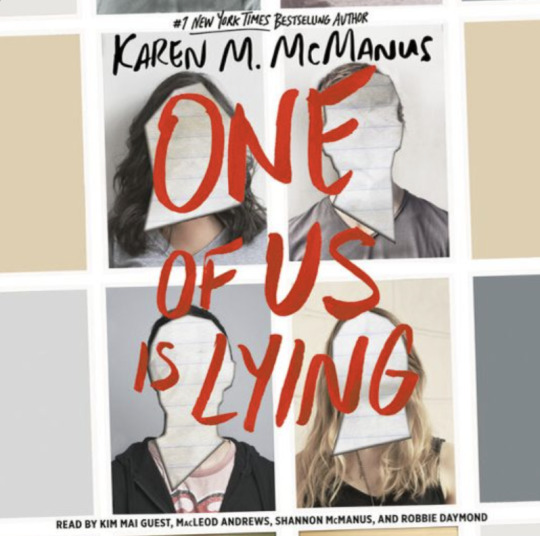
One of Us Is Lying by Karen M. McManus
Four students go into detention, only four walk out alive. Who killed Simon? When secrets Simon knew about the other four students get leaked, any of them could be the killer.
Omg, I enjoyed this so much. I don't like a lot of mysteries/thrillers, but this had me guessing at every turn and I had such a delightful time listening to it. Yesterday, when I got home from work, I just went to my room and kept listening.
Recommended for: people who enjoy a solid murder mystery, fans of Ace of Spades (another book I read recently with similar vibes), and people who like a full cast audiobook.
Content warnings: murder, incarceration, cheating, gossip blogging, suicide
6 notes
·
View notes
Text
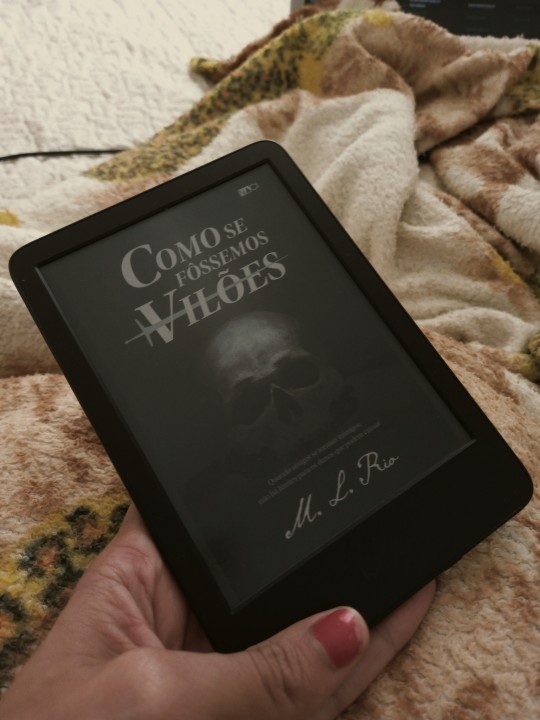
if we were villains - m. l. rio
synopsis
oliver marks has just served a ten year sentence in prison for a murder he may or may not have committed. on the day of his release, he is sought after by the man who was responsible for arresting him. detective colborne is about to retire, but before he does, he wants to know what really happened a decade ago.
seven young actors study shakespeare at a top arts college, oliver and his friends play the same roles both on stage and in real life: hero, villain, tyrant, seductress, maiden, extras, but when the casting changes and secondary characters steal the place of the stars, the plays begin to take a dangerous dip in reality, and one of the friends is found dead. the rest then face the biggest theatrical challenge of their lives: convincing the police (and each other) that they are innocent.
"do you blame shakespeare for some of the things that happened?"
"I blame him for everything."
my opinion
at first, the narrative bothered me a lot, the constant references to shakespeare and the theater made me feel lost in the narrative, but as the reading flowed, i learned to like the references (even tho i don't understand it)
I loved the story and read the book very quickly, I think it was very insightful of the author to have taken her time to get to the main point of the story. before what happened, it was possible to understand the dynamics of the group and where each one fit within the group, following their respective roles. and after what happened, we could see how everything affected each one of them, and it was possible for us to see how they were affected by it and even look at them with a human gaze.
I was very pleased with all the characters, normally i don't like the main characters, but Oliver won me me, I found him very easy to identify with. I would like to have a deeper look at wren, fillipa and alexander, we know so little about them throughout history.
"— when did we become such horrible people? — I asked. — maybe we've always been horrible."
I want to read more books involved in this theme, I wonder if the dark academia aesthetic follows the same rules, cause this book is similar in many aspects to another book I read, the secret history, both bring a lot about the cult of art, obsession and select group of friends with a feeling of superiority.
I find it curious to see how a murder affects groups, normally it is expected that they will unite to protect themselves, but there is no way to escape the human side and the guilt that people carry as a result. SPOILER the “murder” didn't bother me as much as I thought it would, I was conflicted about it, I hated richard, I don't care what happens to him, I was more upset at how it affected the group as a whole. they imploded after that. SPOILER.
I would have loved to have seen the point of view of the other characters, I wanted to know what each one thought of the situation they were in, especially what james thought of oliver.
— you can justify anything if you do it poetically enough
#bookblr#livros#resenha#review#book#dark academia#m l rio#if we were villains#como se fôssemos vilões
21 notes
·
View notes
Note
very, very late question to an old work and I will perfectly understand if you don't want to reply to this and prefer not to bring the discussion toward your old works.
out of curiosity, how much did the hunger games, divergent, maze runner or other dystopian YA works of the time influence TGATNW?
the curiosity stemmed from the fact that while my initial perspective on your works were that they were a complete divergence from mainstream media due to its rawer, kinkier nature, a thought popped up that your works might have (purposefully?) satisfied the trends of the times they were created. the golden age (and fae tales soon after) was an appropriate dystopian rebellion story in the midst of the YA fever in 2014-2015 containing similar tropes.
On the other hand, falling falling stars and other efnisien centric works which address mental health and recovery more heavily than other works were published in the present day while shows on mental health discourse (for instance sex education and euphoria) are increasingly more popular. there are definitely exceptions, but those mentioned are some of your most prominent works.now that I think about it, my question might actually be: if at all, how do current trends influence your narratives? I think I remember a mention of these works' influences being old tales, so it would be interesting to hear how contemporary works have inspired you as well if it all.
thanks Pia! even if you don't reply, thanks for all the time and effort you've put into these works. they mean a lot and so much more to a many people.
This one is easy to answer:
my question might actually be: if at all, how do current trends influence your narratives?
So the TL;DR upfront -> I don't read, and often don't know about current trends. I have zero interest in writing to market. I hadn't read any of those books you mentioned when I wrote The Golden Age that Never Was with the exception of The Hunger Games, which came out over half a decade beforehand (except for the last installment in the trilogy, which was my least favourite lol).
In more detail:
I was inspired to write The Golden Age that Never Was - I can't believe I'm saying this - based on a dream I had in August, 2015.
I read Divergent for the first time in 2016 (er, so after I'd started TGATNW). I read book 1, gave it 2 stars, and don't remember anything about it. I haven't read Maze Runner and I know nothing about it.
Going back through my Goodreads account in 2013 and 2014, I read what looks like almost no books actually published in those years. I read books on cod (literally, the nonfiction book Cod, it's really very good), I read Manna Francis (defo not YA), I read nonfiction books on trauma, I read a bunch of Tricia Owens (M/M not YA), I read Eleanor & Park (YA but contemporary), I read a bunch of M/M, Hagio Moto's Zankoku na Kami ga Shihaisuru manga took over my life for a few months, and then I read a bunch more BL manga (none of it recently published that year) for consecutive months and checked out of anything written in the western world for almost half a year.
I got back into M/M at the end of / beginning of 2015 and it looks like that was all I was reading through all of 2015 with very few exceptions (one more Rainbow Rowell book, Station Eleven by Mandel, and nonfiction). I read no dystopian YA in the 2 year lead up to writing The Golden Age that Never Was. Not a single title. Out of like 200 titles. I didn't even read historical dystopian YA. I think we can safely say that was in no way a direct influence and I can bet you around $500 I had no idea it was a trend lmao.
I do not know exactly how to convey how little I give a shit about reading or responding to publishing trends. I don't care and have never cared. No, wait, I think I attempted to care for about 2 months after seeing a Facebook post about it and then was like 'wait, this is extremely demotivating' and stopped. There are some - few - absolute favourite authors who if they release a book, I will read it that year. (Like the latest Murderbot by Martha Wells). Otherwise I prefer generally not knowing what the trends are, and I don't read author blogs etc. that keep me updated on this. New genres rise and fall and by the time I hear of them, they've either already vanished, or new names have been invented for them.
I feel the same way about music and a lot of television as well. I started watching True Detective for the first time this year. A lot of the music I've listened to and discovered didn't release that music this year. And while I have watched and listened to things that did release this year, it was less because it was 'trendy' and more because they are musicians I've always listened to (Manchester Orchestra) or TV shows I would have wanted to watch anyway.
Also The Golden Age that Never Was isn't dystopian YA. But I wasn't reading much by the way of any dystopian romantic science fiction anyway (and certainly nothing released in those years), and no space operas or anything like that. If TGATNW synced up with any trends at all, it was a happy coincidence. But given I don't think it's YA, if people who only wanted to read dystopian YA found it, they were going to be really disappointed! Lmao.
Around 2013 I also just stopped reading anything heterosexual because I had a choice in the moment and exercised that choice. And I tell you - it's low key hilarious how much you get locked out of almost all the trends (certainly almost 10 years ago) anyway, if you exclusively read same sex.
I also just have general disdain for the idea of purposefully satisfying any kind of fiction trends in fanfiction. Like, no, that's not for me. I think that's a waste of my time, and it's not why I write fanfiction. I write fanfic for fun, and to me, looking at trends and writing to trends is one of the least fun things I can actually think of doing.
(Re: Your Sex Education / Euphoria example, I had to laugh. I haven't seen the latter, and the former I only watched for the first time late last year, when I'd already finished Falling Falling Stars.)
No trend has ever inspired anything I've ever written. And no book / show has ever directly inspired anything I've ever written too. I definitely have inspirations - everyone does - but like, yeah no, one of the reasons I let other people rec works similar to mine is because I can never think of any, because I write because of a perceived vacuum providing what I want to read. If what I want to read is already present and there's a lot of it, I won't write anything, because I don't need to. I am the opposite of an 'adding my book into the pile of a trend' author, like literally, that's a reason to not write for me.
I write what I don't see in the world, and it's pretty much that simple.
#asks and answers#personal#pia on writing#the golden age that never was#like i get that other people write trends very successfully#i hate doing it and i hate even knowing what the trends are#it never lasts and it leads to a bloat in that arena#and honestly anon most of that stuff is still painfully heterosexual#so it's not what i want to read anyway#reading almost exclusively m/m locks me out of almost all the trends#because this world is still heteronormative and writing trends#are still saturated in bigotry#it's gotten better slightly but not a great deal#there are also trends in M/M that i don't particularly care about either#like mafia romance being the rage for the last year or so#in dark m/m romance#like good for them if i feel like writing a mafia romance one day#it'll have nothing to do with what's trendy#will that lose me readers? probably#i can't remember what divergent was about but my review was very scathing and i didn't read any future books fsdalfkajsd
11 notes
·
View notes
Text
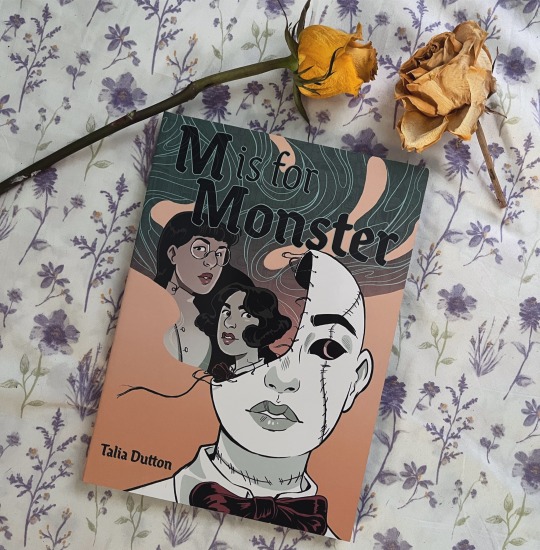
⚡️ M is for Monster by Talia Dutton
Rating: ⭐️⭐️⭐️⭐️⭐️/5
“The moment you existed you should have been loved. Unconditionally and truly.”
When Doctor Franes Ai’s younger sister Maura died in a tragic accident, Frances tries to bring her back. However, the creature that rises from the slab is clearly not Maura. Despite this, Frances tries to teach her to be the sister she once was, while the creature- M- is discovering who she wants to be on her own.
I tried really hard not to cry while reading the ending of this book and I managed to succeed, if not a bit sniffly. This is a beautiful graphic novel of transformation and the burden of living in someone else’s expectations. It was so well done from the greenish-blue color palette to the usage of space in the panels.
As a nonbinary person, I thought this story touched a lot on the gender queer experience as M is trying to figure out who she wants to be without the overhanging expectation of being someone else. This book was so good, you’ll just have to read it to see.
Also, I loved the use of explaining pronouns right away.
#godzilla reads#m is for monster#talia Dutton#book review#graphic novels#reading#book blog#booklr#bookworm#bookish
22 notes
·
View notes